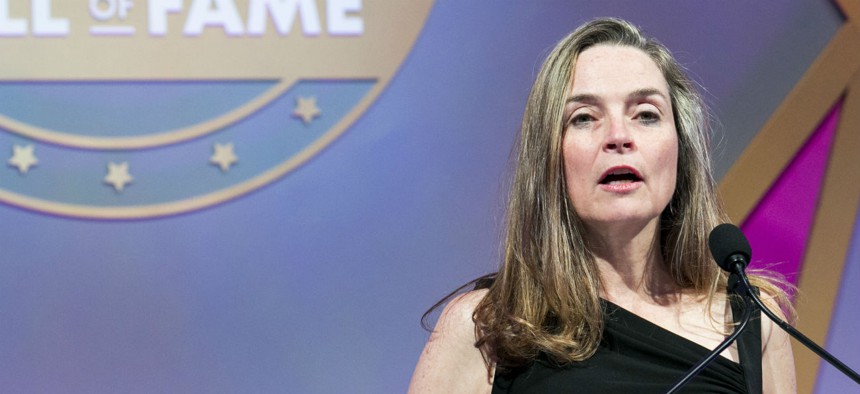
OMB Deputy Director for Management Margaret Weichert presents an award at a Government Executive gala in September. Weichert said Wednesday that federal employees are not motivated by pay. Kristoffer Tripplaar Photographer
White House Official Said Feds Don't Care About Pay, HR Officials Disagreed
"Nothing says thank you like cash," one agency leader says.
Federal employees do not care much about their pay, a White House official said during an event in downtown Washington on Wednesday.
Shortly thereafter, human resources officials on the front lines at federal agencies delivered a contradictory message: actually, federal employees care a great deal.
“We already know this isn’t the most attractive place,” Margaret Weichert, deputy director for management at the Office of Management and Budget, said of working for the government, during an event hosted by Government Executive. “And it isn’t the money, people. It’s, ‘I come to government and I got great ideas and I want to make an impact and I can’t. I’m stuck. I can’t make the impact I came here to do.’ That’s a problem.”
She added: “We’re not here for the money, right? This is not why we do this.”
Immediately following her speech, several agency officials spoke on a panel about performance management.
“We do usually hear it’s not about the money,” said Joe Sullivan, the acting head of the Housing and Urban Development Department’s Employee and Labor Relations office. “But nothing says thank you like cash.”
Stephanie Platz-Vieno, director of human development for the National Geospatial-Intelligence Agency, highlighted her agency’s move to make employees eligible for performance awards on a quarterly, rather than annual, basis.
“When we went from one time awards to quarterly, it was to ensure we didn’t miss anybody,” Platz-Vieno said. “Quarterly helps to look at everybody.”
Kimberly Walton, the Transportation Security Administration’s executive assistant administrator for enterprise support, discussed TSA’s move to a new pass-fail performance management system that creates new opportunities for top performers to receive monetary awards. TSA has also stressed the system would make it easier for TSA employees to receive positive ratings and accompanying pay raises.
The officials also promoted the benefits of non-monetary awards. Platz-Vieno noted other initiatives popular with the NGA workforce include time off bonuses, peer-to-peer recognition and entering employees into non-governmental award programs.
While top Trump administration officials have repeatedly stressed federal employees are motivated more by the mission of their agencies than their paychecks, the White House earlier this year seemed to acknowledge the workforce does appreciate a salary bump. After proposing a 2020 pay freeze for feds in his budget earlier this year, the president reversed course in August to suggest a 2.6% increase to take effect next year.
While she does not see pay issues as a driving force for recruiting, Weichert said she expects agencies to continue to struggle to bring top talent into the fold.
“It’s not going to get easier for us to get the best and brightest into government, it’s going to get harder,” she said.
Weichert explained that the government's human capital issues still need to be solved.
“I don’t know what the answers are here but the questions are profound,” she said.







